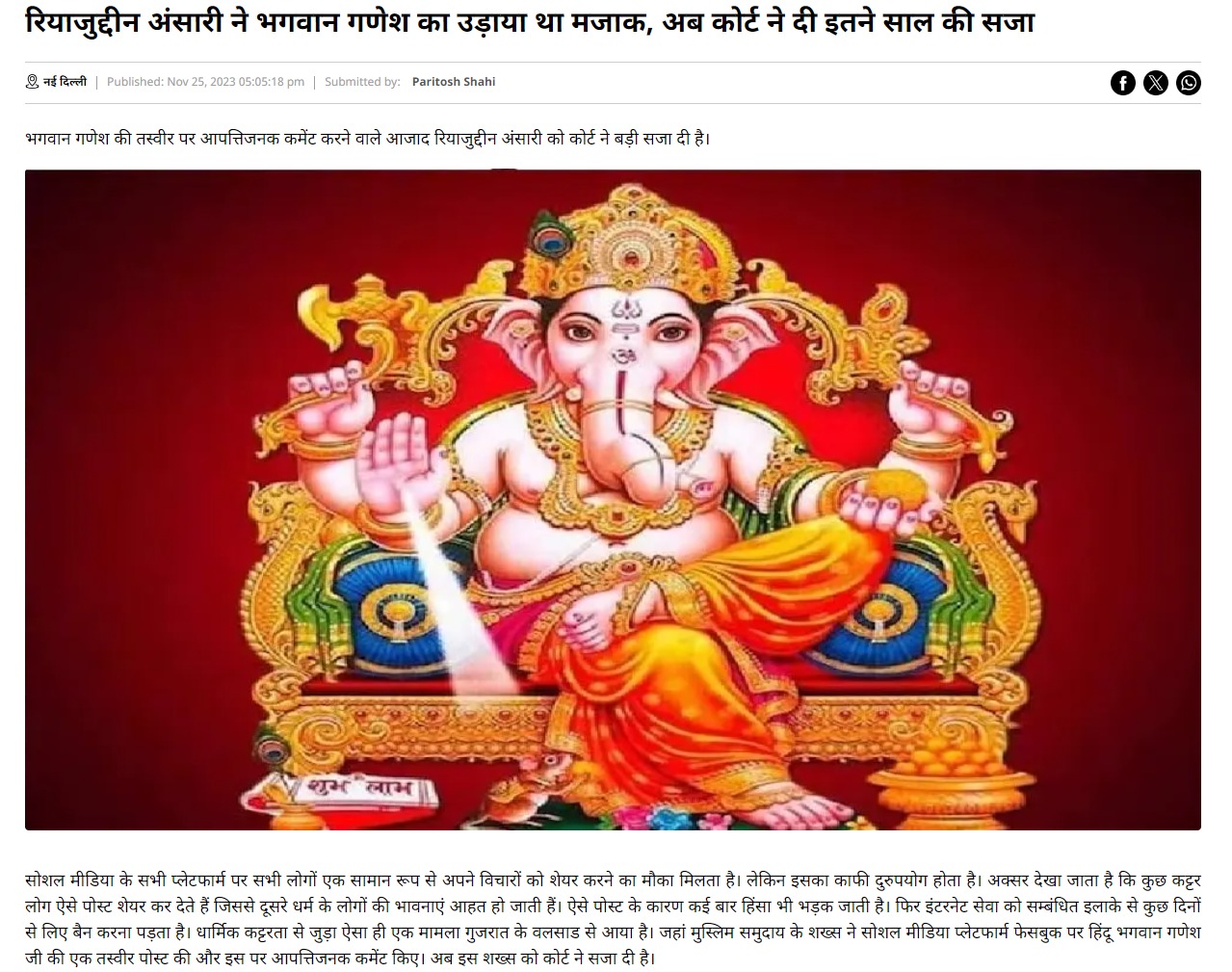More Coverage
Twitter Coverage
Satyaagrah
Written on
Satyaagrah
Written on
Satyaagrah
Written on
Satyaagrah
Written on
Satyaagrah
Written on
JOIN SATYAAGRAH SOCIAL MEDIA
"Honor or Endure": Azad Ansari's 3-year sentence for insulting Sri Ganesh during Ganeshotsav on Facebook, a stark warning in Gujarat; respect Hindu beliefs while in Bharat or face legal consequences, a significant verdict upholding Hindu religious dignity

In Gujarat, a notable legal case came to a conclusion, underscoring the sensitivity and importance of religious sentiments in India. On 25th November, the Additional Judicial Magistrate Court of Valsad sentenced Azad Riyazuddin Ansari to three years in prison for posting derogatory content about Lord Ganesha on Facebook. Additionally, Ansari was fined Rs 50,000 for his actions, which were deemed offensive to the Hindu community.
|
This case, originating five years ago, spotlights the repercussions of disrespecting religious figures in India, a country deeply rooted in religious and cultural traditions. Ansari's post during Ganeshotsav in 2018, a festival widely celebrated with great reverence across India, was not just a mere social media misstep but a significant affront to the religious sentiments of the Hindu community.
In a country like India, where Hinduism is the majority religion, such acts of disrespect towards revered deities are not only considered offensive but also a breach of communal harmony. The swift and decisive legal action in this case reflects the seriousness with which religious sentiments are guarded in Indian society.
The court's ruling serves as a stark reminder of the boundaries of expression, especially in a diverse and religiously sensitive nation like India. The fine and imprisonment imposed on Ansari highlight the legal system's commitment to protecting religious sentiments and maintaining societal harmony.
This incident underscores the critical need for awareness and respect for different religious beliefs and practices in India. It also serves as a cautionary tale about the impact of social media posts, reminding individuals to be considerate and mindful of the diverse cultural and religious landscape in which they live.
The case of Azad Riyazuddin Ansari is not just about legal consequences; it's a reflection of the broader social and religious fabric of India and the imperative to navigate it with respect and sensitivity. The sentencing is a clear message against religious insensitivity, aiming to uphold the values of tolerance and respect that are fundamental to the Indian ethos.
 |
The case against Azad Riazuddin Ansari, a 34-year-old resident of Shalimar Apartment in Valsad, draws attention to the cultural and religious sensibilities in India, particularly towards Hindu deities. On 17 September 2018, Ansari committed a significant blunder by sharing an offensive and blasphemous photo of Lord Ganesha on social media. The post included an edited photo of a dog petting a statue of Lord Ganesha, accompanied by derogatory commentary, described as "Ganeshji ki pooja karta kutta." This act of disrespect towards a revered deity in a predominantly Hindu nation like India was not only seen as offensive but also as an act of blasphemy.
The backlash to Ansari's post was immediate and intense. Many individuals expressed their opposition, and members of Hindu organizations reportedly took a more direct approach by garlanding Ansari with shoes, a symbolic act representing extreme disrespect in Indian culture. This response, while reflecting the depth of offense taken by the Hindu community, also highlights the societal boundaries that are deeply ingrained in the Indian consciousness regarding religious respect.
The registration of a case against Ansari for hurting the sentiments of the Hindu community is indicative of the legal and social repercussions of such actions in India. The country, known for its diverse religious practices and deep-rooted spiritual traditions, holds a collective understanding and expectation of respect towards all religions. Insulting religious figures, especially in a public platform like social media, is not only seen as an individual misjudgment but also as a disruption of societal harmony.
This incident serves as a stark reminder of the importance of religious tolerance and the need for sensitivity towards different faiths in India. It also underscores the potential consequences of irresponsible social media behavior, especially in a context where religious sentiments are interwoven with national identity. The legal action taken against Ansari is a testament to the seriousness with which religious disrespect is viewed in India, reflecting a broader commitment to maintaining communal harmony and respecting the diverse religious sentiments of its population.
The incident involving Azad Riazuddin Ansari in Valsad, where he insulted Lord Ganesha through a social media post, drew swift and decisive attention from local Gaurakshaks and members of Hindu organizations. Prominent figures like Bakul Rajgor and Hemant Khernar, along with other workers, responded to the incident by lodging a protest at Ansari's shop. The response escalated as Hindu protestors reportedly garlanded Ansari with shoes – a symbol of extreme disrespect in Indian culture – and took out a procession. This public demonstration of discontent reflects the deep sensitivity towards religious sentiments in the Hindu community.
Following these events, a formal complaint was filed against Ansari, leading to his arrest on 18th September 2018 by Valsad City Police. He was charged under Sections 153(A), 295(A), 114 of the Indian Penal Code (IPC), and Section 67 of the Information Technology Act. These sections pertain to offenses related to religious sentiments and the misuse of information technology for such purposes.
 |
The case was then presented to the Additional Magistrate Court of Valsad, where, during the investigation, Ansari's actions were substantiated. The court, after considering the police complaint, witness testimonies, and evidence, convicted Ansari.
This case highlights a significant shift in how religious offenses are addressed in India, especially under the current political climate. The BJP, known for its support of Hindutva, has been at the forefront of promoting and maintaining the country's harmony. This incident underscores the departure from previous eras, notably during the Congress party's rule, where there were perceptions of the Muslim minority being used for political gains at the expense of the Hindu majority. The swift and firm response to Ansari's actions reflects the current government's stance on preserving religious harmony and respecting the majority sentiment, while also balancing the rights and dignity of all communities.
In this context, the action taken against Ansari serves not just as a legal repercussion for his actions but also as a broader statement about the importance of religious respect in India's socio-political landscape. It demonstrates a commitment to upholding the sanctity of religious beliefs and practices, crucial for the country's unity and harmony, especially at a time when the government is keenly focused on promoting a sense of national identity rooted in cultural and religious respect.
After an extensive legal process spanning five years, the Additional Judicial Magistrate Court of Valsad delivered a significant verdict in the case against Azad Riazuddin Ansari. Ansari, who faced charges for his derogatory social media post about Lord Ganesha, was convicted under Section 248(2) of the Code of Criminal Procedure (CrPC), alongside Sections 153(A), 295(A) of the Indian Penal Code (IPC), and Section 67 of the Information Technology (IT) Act.
The court's decision to convict Ansari reflects the seriousness with which the Indian legal system treats offenses related to religious sentiments and the misuse of information technology in propagating such sentiments. The Sections under which Ansari was convicted pertain to promoting enmity between different groups on grounds of religion, deliberate and malicious acts intended to outrage religious feelings, and publishing obscene material in electronic form, respectively.
The sentencing of Ansari to three years of imprisonment and the imposition of a Rs 50,000 fine underscore the consequences of disrespecting religious figures and beliefs in India. This judgment is particularly notable given the current socio-political climate in India, where there is an increased emphasis on preserving religious harmony and respecting the sentiments of the majority Hindu population, alongside safeguarding the rights of minority communities.
The availability of the court order with OpIndia provides an opportunity for the public and the media to review and understand the legal rationale behind the verdict. This transparency is crucial in fostering public trust in the judicial system and in reinforcing the message that religious tolerance and respect are paramount in a diverse country like India.
In conclusion, this case and its outcome serve as a reminder of the importance of exercising responsibility and sensitivity on social media platforms, especially in a country like India, where religious sentiments are deeply interwoven with the fabric of society. The verdict is a testament to the Indian judiciary's role in upholding the law while balancing the need to maintain communal harmony and respect for all religious beliefs.
 |
 Support Us
Support Us
Satyagraha was born from the heart of our land, with an undying aim to unveil the true essence of Bharat. It seeks to illuminate the hidden tales of our valiant freedom fighters and the rich chronicles that haven't yet sung their complete melody in the mainstream.
While platforms like NDTV and 'The Wire' effortlessly garner funds under the banner of safeguarding democracy, we at Satyagraha walk a different path. Our strength and resonance come from you. In this journey to weave a stronger Bharat, every little contribution amplifies our voice. Let's come together, contribute as you can, and champion the true spirit of our nation.
 |  |  |
| ICICI Bank of Satyaagrah | Razorpay Bank of Satyaagrah | PayPal Bank of Satyaagrah - For International Payments |
If all above doesn't work, then try the LINK below:
Please share the article on other platforms
DISCLAIMER: The author is solely responsible for the views expressed in this article. The author carries the responsibility for citing and/or licensing of images utilized within the text. The website also frequently uses non-commercial images for representational purposes only in line with the article. We are not responsible for the authenticity of such images. If some images have a copyright issue, we request the person/entity to contact us at satyaagrahindia@gmail.com and we will take the necessary actions to resolve the issue.
Related Articles
- Only Dhimmis can be a good Hindu – An article on Shekhar Gupta’s ThePrint argues ‘defending namaz’
- Shivling discovered in the Gyanvapi complex during a survey after the water was pumped out of a well that Muslims were using as 'Wuzukhana' for washing their hands and feet before offering Namaz
- "There is difference between blasphemy and expressing religious opinions based on one’s knowledge of the subject": Historic decision by Madras High Court from 2019
- 'Found stone carvings of Hindu Gods-Goddesses, lotus, Seshnaag, Shrigar Gauri shrine distinctly visible, absolute remnants of ancient Hindu temple': Survey commissioner Ajay Mishra reports, Muslim side continuously uncooperative
- In a major development, Mathura court allowed a plea to remove the disputed structure of the Shahi Idgah Mosque near Krishna Janmabhoomi for hearing: suit filed in the name of "Bhagwan Sri Krishna Virajman"
- In another shocker, Supreme Court quotes 'every sinner has a future' and commutes death sentence of Mohd Firoz for rape & murder of 4-year-old girl: Child brutally assaulted, two teeth broken while smothering after rape
- No evidence to tie Dinesh Yadav to violence, intention assumed based on him being Hindu: Anti-Hindu riots by Muslim community that shook the capital city of India and analysis of the conviction
- Calcutta Quran Petition: A petition to ban the Quran altogether was filed 36 years ago, even before Waseem Rizvi petitioned for removing 26 verses from Quran
- SC bench of Justices Chandrachud and AS Bopanna rules in favor of Muslim petitioner: “Don’t exclude non-Hindus from auction process for shop leases in temple”
- Chennakeshava temple in Belur kicks off 'Rathotsava festival' with Quran recitation: Earlier temple administration requested Muslims to vacate their shops, however, Govt gives their nod for non-Hindus to set up stalls throughout festival
- Twitter rewards an Islamist org, set to be banned by India, with a verified blue tick: Here is what PFI has done in the past
- Erotic slurs, explicit images, and rape threats, how hostility towards Hindu women continues unflagging on social media
- Radical Mohammedans chopped off Dilbar Negi's limbs and burnt him alive, the Islamic mob torched properties of Hindus till 24th Feb night: Fresh charge sheet against 12 in Delhi riots
- "न्याय, मलाई मार के": In 1992, hundreds of Hindu girls were exploited in the Ajmer gangrape case by 'Khadims' of the Dargah and ex-Congressman Nafis Chisti, with the perpetrators only being convicted by the POCSO court after a long, grueling 32 years
- Rootless liberal Macaulayputra and the two Indias when it comes to secularism




























